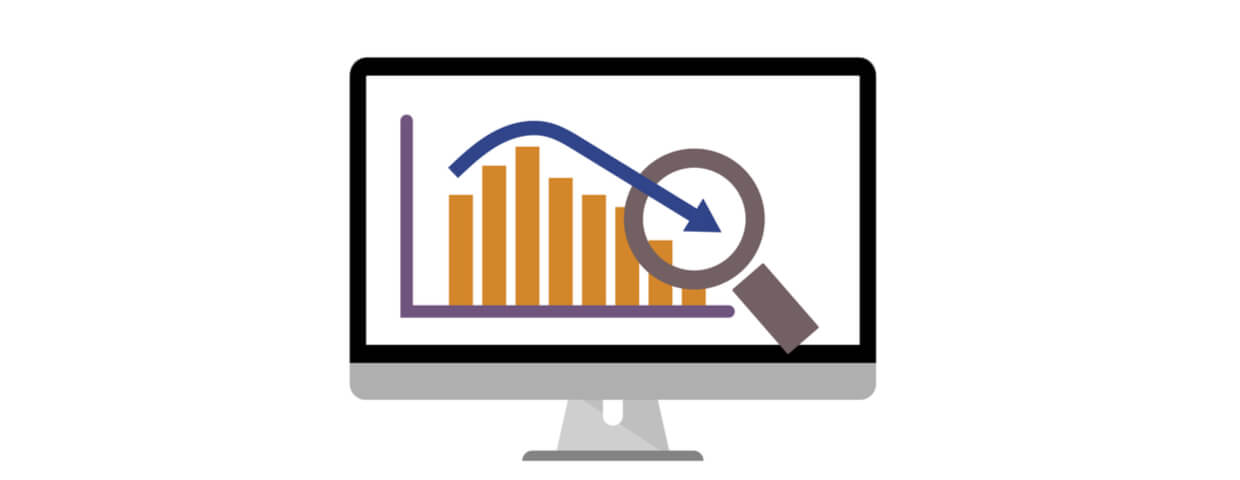Diagnosing Website Traffic Drops
Posted by Emery Pearson on Nov 12, 2020 9:45:00 AM

Whether a sudden or slow drop over time, when your website traffic dips, it can be frustrating. It can be especially frustrating when you can’t figure out why. The truth is, there are many reasons why web traffic can take a dive, and it can take a little detective work to understand what’s happening. While the answer may not always be clear, there are some things you can research to see if you can make a diagnosis.
Understanding the Type of Traffic You’re Losing
Typically drops happen in organic traffic, but not always. When you’re looking at the big-picture data, zoom in and make sure you see what types of traffic you’re losing. The easiest way to do this is to head to Google Analytics and dig around in the data. Look for organic traffic (visitors who find your site via search engines), direct traffic (visitors who go straight to your website), paid traffic (visitors who click on one of your ads), social traffic (visitors who come from a social media site), and referral traffic (visitors who click on a link to your site from another website).
Why Am I Losing Organic Traffic?
If you’ve established that the drop in traffic is organic, your next step is to do some research to uncover potential reasons why. Some questions you might ask include:
-
Have you redesigned or made any significant changes to your website?
-
Have you been hit with a manual penalty from Google?
-
Were there any significant Google algorithm updates recently?
-
Is there a spike in the number of pages Google has deindexed?
-
Have you been optimizing and updating your most popular pages and posts?
-
Which keyword rankings have dropped?
-
Did you lose backlinks to your site?
Let’s take a closer look at what these questions might indicate.
If you’ve made significant changes to your site, Google may stop showing your pages in the SERPs (search engine results pages) while it recrawls and reassesses your site. You can get more info on search appearances through Google Search Console, so it’s worth a look to see if there are big dips in impressions on certain pages.
If this is the cause of your traffic drop, there’s a good chance it will even out on its own–that is, if there aren’t big changes to your content, the user experience, or technical aspects like site speed. However, if you created a bunch of new pages and redirects, it may not be quite as simple as letting Google get to know your new site. You might have to do some work to recover rankings and traffic, and it might be as though you are starting fresh.
Manual Penalty
To see if you’ve been hit with a manual penalty, you will need to go to Search Console, navigate to Security & Manual Actions on the left side navigation, and click Manual Actions to see. If you have received a manual action, that is why your traffic has tanked. Recovering from a Google penalty can be tricky and time consuming, but there is plenty of advice available from Google and across the web with how to approach this. We covered manual actions from bad backlinks here.
Google regularly updates their algorithms, but sometimes the big ones–like Penguin, Panda, and BERT–can cause waves across the internet. If you have lost traffic after a significant update, your best bet is to learn more about what that update does in order to understand what Google is looking for. For instance, upcoming updates will be around Google’s Core Web Vitals, which will take into account things like site speed and mobile-friendliness. Google’s emphasis on these factors mean that they will become ranking signals, and sites that are not up to par technically will likely suffer from these updates.
In Google Search Console you can see the pages that Google has indexed and those they have not in the Index Coverage Report. Non-indexed pages will not appear on the SERPs, so it is important to get to know this data. If you’ve seen a big drop in traffic, it’s a good idea to see if Google has de-indexed a portion of your pages. There are a few reasons why this might happen:
-
You might be getting a manual penalty
-
You might have duplicate content
-
You might have other issues on your site, like thin or irrelevant content
-
You might have technical issues, such as pages blocked by robots.txt, pages timing out, or noindex tags added to pages
Sometimes Google gives a reason for pages not being indexed, like non-canonical pages, blocked by robots.txt, or 404s. Other times it’s just simply “Crawled – currently not indexed.” If there aren’t any reasons given, you might want to assess your site and see if you need to do something with the old content.
If you’ve just been getting by with a bunch of old content and you’re not updating or refreshing any of it, then there’s a good chance you’ll start losing traffic after a while. Google likes fresh, updated content, and there’s always plenty of competition, in any industry. Plus, older content can be undermined with Google updates.
While this won’t really give you a solution, it can be useful to get a look at your historical keyword rankings to see if that gives any indication of what is being impacted. If you see some drops in rankings, you might need to do better optimizing around those keywords–you’ve probably got a new competitor who is doing things better. It’s good to do some research and scope out the SERPs if you’ve lost specific keywords.
Link building can be such a chore, but it pays off in spades. However, if you have some really good backlinks to your site and you suddenly lose them, you could see a drop in traffic. If that’s the case, you might need to reach out to the website that was linking to you to see if there was an error, or you might need to focus your efforts on getting new backlinks.
There are multiple reasons websites lose traffic: algorithm updates, manual penalties, big changes on your site, lost keywords or backlinks. Once you determine the culprit, though, you can start working toward recouping your losses.
Need some help? Click below to schedule a checkup.

Written by Emery Pearson
Emery is the content strategist at Tribute Media. She has an MA in rhetoric and composition from Boise State University, and she is currently an MFA candidate in creative writing at Antioch University. She lives in southern California with a bunch of creatures and many plants.



